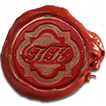There is a Canadian alternative rock band from Tsawwassen called 54-40, named after the longitudinal line of 54’40°… where in the 1840s, U.S. President James Polk wanted the border. That whole dispute is a long story on its own, but suffice it to say, “we” won — otherwise, places like Prince Rupert, Terrace, Prince George… and everything south of that — would be American territory. A tiny part — the southern tip of the Alaska Panhandle — is all that’s left of that line.
That 54’40° line is very far north of Tsawwassen, but just south, literally bordering it, is the 49th parallel, the agreed-upon resolution to the aforementioned dispute. Another long story, but the short of it was that west of somewhere, the 49th parallel would define the Canada/U.S. border. It was a lengthy back-and-forth, and pretty-much the last thing settled was the exception of the southern tip of Vancouver Island. Before that, the border sliced right across it, but that didn’t make a lot of sense, and it was the final concession granted. But nobody noticed till after, the tiny (less than 5 square miles) little peninsula that’d been chopped off and isolated… and when they did, they just decided to leave it for another day. Probably the U.S. would just cede it back to Canada, and that would be that, right? Wrong.
And that is why there is a tiny U.S. enclave, completely landlocked by Canada. It has an official border crossing, and while its residents are officially living in the U.S., it’s Canadians who make up the vast majority of visitors, to buy cheap gas and access “Suites” (really, just P.O. Boxes) to take delivery of items that won’t ship to Canada, but will to the U.S. Ironic, of course, is that all of those goods must go through Canada to get there.
Way back when, that border crossing was little more than a formality. Those 54-40 guys rode their bikes in and out of there and barely waved at the border guard. You could go down to the beach, draw a line in the sand, and jump back and forth between countries. Before 9/11, you didn’t need a passport. And while technically, you’re supposed to declare everything you buy down there, apart from liquor and cigarettes, nobody cares. But, on that note, funny story.
At some point in the late 80s, I was flying down to Chile to visit family. My uncle and aunt who lived down there smoked a very unique brand of smokes that was only available in the U.S., so he asked me to bring him “as many as you can”. I told him that it would be way over the limit and the duty on it would be ridiculous, but he said not to worry about it. He’d pay me back everything. And furthermore, if I did it right, I could get those duty payments back when I left the country with the cigarettes.
So a couple of days before my flight, I headed down to Pt. Roberts, went to that one big gas station/store and picked up all of the “Now” brand menthol cigarettes they had. Seven cartons (not packs — cartons) — so 70 packs of cigarettes. I think 1,400 cigarettes is probably over the “out of the country for 20 minutes” limit, but I had no intention of smuggling them — I was going to be paid back, whatever it was.
The look on the guy’s face was pretty good though… anything to declare? Yeah, cigarettes. How many? Seven cartons. That got him to sit up straight. He made me pull over and get out. He looked at my backseat, packed with cartons. He looked at the receipt. He told me to come inside. So I went into his tiny hut. There was a hockey game playing in the background, on a postage-stamp-sized black & white TV. His first question was, “What are you doing?”
I explained the whole thing to him, how I’m happy to pay the duty, how all of those cartons would be leaving the country in 48 hours, how I don’t mind paying, but I want to make sure I can get that money back. Yes… he said, that’s all correct. OK.
He pulled out a huge stack of paper. He let out a big sigh. On TV, Tony Tanti scored a goal. He picked up the pen, put it down, looked me straight in the eye and asked, “Do you promise me you’re taking all of these out of the country?” “Yes!” “Ok, get out out of here”.
Apart from the technicality of it being part of the U.S., it may as be Canada. This friendly American enclave is a great place to “live” in Canada but still “live” in the U.S., if you know what I mean. For residency purposes, many Canucks and Grizzlies have lived there.
Back in grade 10, a new band teacher showed up — Mr. Mercer — fun, jolly American guy, who lived in Point Roberts, worked in Vancouver, and proudly announced how he paid taxes in neither. Music was a big part of my life, so I spent a lot of time in the band room, and was having lunch there one day with some friends when a couple of guys in dark suits showed up looking for Mr. Mercer. I guess they eventually found him, because he was never seen nor heard from again. Staff wouldn’t talk about it, except to say he’d had some legal issues and wouldn’t be back. Nice guy — I hope the Club Fed he was thrown into wasn’t too bad. And as an interesting coincidence, to loop things around, a few of those school bands I played in was alongside a guy called Dave Genn… who in 2003 joined 54-40 and has been their lead guitarist ever since.
And speaking of looping things around… way back in the day, we used to go down to Pt. Roberts to a place called The Breakers… it was a happening place in the early 90s — always a fun experience. I was usually the designated driver for such outings, but on this particular night, I’d had a bit too much… so someone else took the wheel. We all piled into the rickety VW van for the trip home, being loud and obnoxious as you might imagine, but as always, getting quiet at the border. We drove up to the border crossing little hut, that night inhabited by a tired-looking near-the-end-of-his-career border guard. The old guy stuck his head in the window and looked back at us, all staring at him.
“You boys been drinking?”, he asked.
“Well — they have, but I haven’t”, replied our driver, pointing his thumb back at us.
“OK, off you go, drive safe.”
And that was that… back to whooping and hollering… but suddenly (queue the Twilight Zone music), things didn’t look right. It’s a straight line from the border to highway 17, cutting straight through Tsawwassen, but that’s not where we were. We were on some winding road in the middle of a forest. What just happened?
We’re all screaming “You idiot!” “Turn around” “What are you doing?” “Where are we?” — but on we go… and suddenly… more Twilight Zone music… up ahead is the same border crossing we’d just crossed 10 minutes earlier. Don’t ask me. I mean, obviously, he’d somehow turned left, then left again, and entered Point Roberts through some back road… and we’d looped back and… here we were.
Now we were terrified. “Stop!” “Don’t stop!” “Pull over!” “Don’t pull over, that looks suspicious!”. Well, we drove straight up to the same little hut, same old guy. And he stuck his head in the window and looked back at our petrified faces.
“You boys been drinking?”, he asked, with the exact same tone as before.
“Well — they have, but I haven’t”, replied our driver, giving the same thumb gesture as before.
“OK, off you go, drive safe.”
The rest of the (careful) ride home was silent.
What’s the deal with Point Roberts these days? Is that border all locked up like the rest of the 49th? There’s no hospital or pharmacy down there, and American citizens are not allowed into Canada except when it’s essential. I couldn’t find much about it, but I have to assume a medical emergency would count as essential. Unless you’re symptomatic, then what? I hope the have it figured out. Especially since 99% of the money spent in Pt. Roberts comes from Canada, and that’s dropped to near zero for now.
Point Roberts is part of Washington State, and there’s not much bad to say about Governor Jay Inslee’s handling of this difficult situation. President Trump told him, “You’re on your own”, and they’re rolling with it. I hope that includes a plan for Point Roberts.
Yes, it occurs to me there’s not much tie-in here with our present pandemic except this: this whole topic of Pt. Roberts came up because of the wonky Detroit/Windsor border, and how different Ontario and Michigan are in handling things. I’ll once again go on the record to state my appreciation for our local neighbours to the south. We, here, have a lot more in common with our American counterparts than they do over in Ontario, something that will become more and more relevant as things open up. B.C. and Washington are in agreement on most things, and on the same page about how phased re-openings should look. Works for me. And them.









